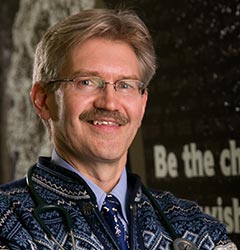
“Conducting a randomized controlled trial in long-term care environments…transforms our expertise from monitoring efforts to evaluating innovative infection control approach in a highly vulnerable population.”
—Jonathan Temte, MD, PhD
Influenza is a devastating infection that disproportionately affects residents of long-term care facilities (LTCFs), resulting in high attack rates, frequent hospitalizations and mortality.
With grant support from the Wisconsin Partnership Program, the UW Department of Family Medicine and Community Health’s Jonathan Temte, MD, PhD, will lead a multidisciplinary team of researchers in an innovative infection control approach for this highly vulnerable population.
How the Study Works
The project will test the effectiveness of simple, inexpensive and adaptable technology for extremely early on-site detection of influenza in LTCFs.
Twenty LTCFs across Wisconsin are participating in the randomized controlled clinical trial. At the intervention sites, nurses will collect nasal swab specimens from residents with acute respiratory infections, and perform rapid influenza detection testing of the specimens. Anonymous results will be sent automatically and wirelessly to the study team and public health personnel for daily review.
If a result tests positive for influenza, the study team will communicate directly with LTCF staff, providing advice on antiviral treatment, antiviral prophylaxis, and appropriate infection control practices.
Over the course of three influenza seasons, the team will collect and analyze data on prescribing patterns of influenza antivirals (for treatment and prophylaxis), as well as influenza-related hospitalizations, deaths and healthcare-associated costs.
In addition to Dr. Temte, the study team comprises the DFMCH’s Irene Hamrick, MD, and Marlon Mundt, PhD, plus Wisconsin State Laboratory of Hygiene diagnostic laboratory scientist Peter Shult, PhD, and Wisconsin Division of Public Health influenza epidemiologist Tom Haupt, MS.
A New Model for Influenza Control
For Dr. Temte, the study represents a new direction in his research.
“Conducting a randomized controlled trial in long-term care environments is a major shift from our past efforts,” he reflected. “It transforms our expertise from monitoring efforts to evaluating innovative infection control approach in a highly vulnerable population.”
Currently, the 396 LTCFs in Wisconsin have beds for 33,851 total residents—a growing population that contributes disproportionally to the estimated $160 million in annual economic costs of influenza for elder Wisconsinites.
Although early public health involvement can help manage influenza outbreaks in LTCFs, current approaches and capacities for detecting influenza are often inadequate. Delays thus allow the disease to spread within a LTCF and affect higher numbers of residents.
If the project proves effective, it could serve as translatable model for very early and proactive influenza control in more LTCFs, allowing for appropriate interventions that reduce morbidity, mortality and healthcare-associated costs.
The project, Rapid Assessment of and Prophylaxis for Influenza in Dwellers of Long-Term Care Facilities (RAPID-LTCF), is supported by a three-year, $500,000 grant from the Wisconsin Partnership Program’s Collaborative Health Sciences Program
Published: October 2016
